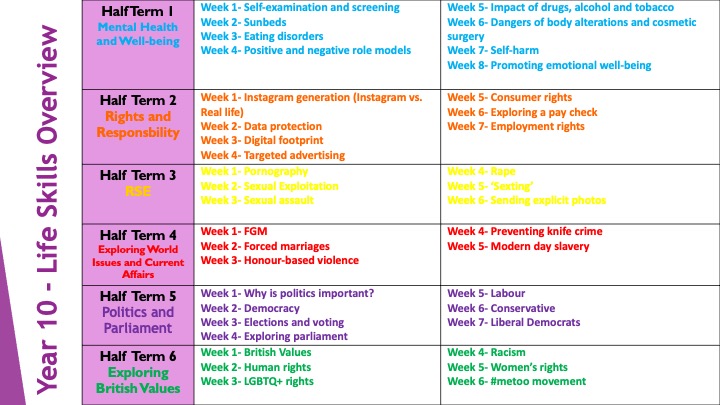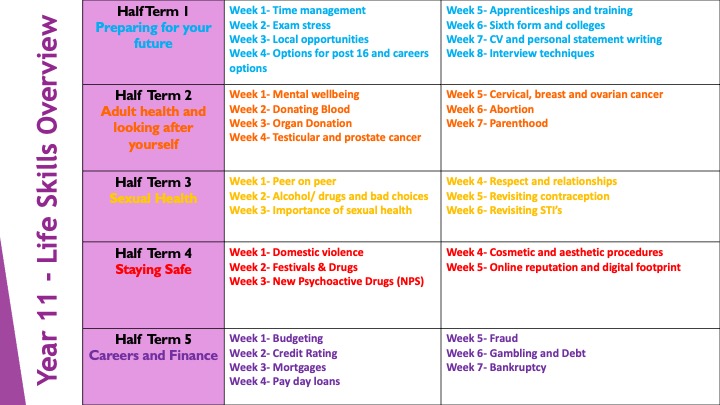Curriculum for Life
Preparing our students for the tests of life and not a life of tests
Component 1 – Collective Worship
Once a week, students gather together as a year group to take part in Collective Worship, coordinated by our Chaplain. This is a sacred time to pause and reflect at the beginning of the day – to think deeply about ourselves, our community, our world and our faith. Collective Worship covers a wide range of themes including religious festivals and seasons, Christian values, national awareness weeks, charity and social action projects. Collective Worship underpins all the Curriculum for Life elements, not only through the half-termly themes that are consistent across CfL, but also through the embedding of Christian values and ethos throughout our teaching and learning. Collective Worship also extends beyond the weekly assembly through charity projects, special services, religious trips and retreats. This year we are supporting the following charities: Foodbank, Kind, Mary’s Meals, Nugent, YPAS and Alder Hey.
Component 2 – Stories for Life
Once a week, students will take part in collective reading. Our aim with Stories for Life is to catalyse, instil and maintain a love of reading, in which students are taken on a journey. Each of the books has been carefully selected due to winning prestigious awards, fantastic reviews and due to what they can teach our students beyond the scope of academia: the power that books have to expose students to a world outside of their own; to walk in another’s shoes and develop compassion; to relate to experiences and find comfort in shared thoughts, feelings and human reactions. These books are incredibly relevant, acclaimed and most significantly, have been chosen with the view that students will find them interesting, engaging and relevant. These novels have also been heralded as combatting and educating young people on important life topics and will be consolidated and corroborated by the statutory work undertaken during students’ Life Skills sessions.
The books which has been selected for year 10’s is The Perks of Being a Wallflower by Stephen Chbosky. This novel has been selected as it deals with very important themes such as positive and negative role models, impact of drugs, promotion of emotional well-being, relationships and abuse.
This is the story of what it’s like to grow up in high school. More intimate than a diary, Charlie’s letters are singular and unique, hilarious and devastating. We may not know where he lives. We may not know to whom he is writing. All we know is the world he shares. Caught between trying to live his life and trying to run from it puts him on a strange course through uncharted territory. The world of first dates and mixed tapes, family dramas and new friends. The world of sex, drugs, and The Rocky Horror Picture Show, when all one requires is that the perfect song on that perfect drive to feel infinite.
Through Charlie, Stephen Chbosky has created a deeply affecting coming-of-age story, a powerful novel that will spirit you back to those wild and poignant roller coaster days known as growing up.
Component 3 – Debate and Discussion
Each week, Debates and Discussions will broaden the horizons of our students, exposing them to articles produced from a range of exciting and reputable sources such as National Geographic and a broad range of newspapers which will enable students to not only explore the opinions of others, but their own individual perceptions of the world around them. The articles are up-to-date, thought-provoking and diverse in their content, emphasising many of the topics explored in Life Skills and allowing students to develop their communication skills, build trust within their form group and establish positive relationships with those around them- whether their views align or not! This not only improves our students’ ability to read information and make inferences, but to develop their critical thinking and oral literacy skills through contributing to important discussions. From articles surrounding Tik Tok, to Marcus Rashford’s campaign for children, to the impact of social media, our students will become educated about the world around them and their part in shaping that very same world.
Component 4 – Life Skills

Component 5 – Moral Dilemmas
Once a week students will have the opportunity to discuss moral dilemmas in their life tutor groups. Students will watch a clip of a moral dilemma which they will then discuss with their peers. They will also answer some posed questions that will direct a constructive discussion amongst the life tutor group. This component will require students to reflect on their own morals and explain their thoughts in a respectful manner. It will also allow students to listen to others people’s views in their class, encouraging compassion and tolerance amongst our student body. As a result, children become reasonable in both senses of the word —they are adept at reasoning and they are open to the reasoning of others. There may not be a right or wrong answer but creating further questions is definitely encouraged. This component will develop the literacy and oracy skills, as well as have a positive effect on student’s emotional awareness. Additionally, it will allow students to keep up with local and national news as the moral scenarios we will be exploring will be current and relevant to the youth of today.
Component 1 – Collective Worship
Once a week, students gather together as a year group to take part in Collective Worship, coordinated by our Chaplain. This is a sacred time to pause and reflect at the beginning of the day – to think deeply about ourselves, our community, our world and our faith. Collective Worship covers a wide range of themes including religious festivals and seasons, Christian values, national awareness weeks, charity and social action projects. Collective Worship underpins all the Curriculum for Life elements, not only through the half-termly themes that are consistent across CfL, but also through the embedding of Christian values and ethos throughout our teaching and learning. Collective Worship also extends beyond the weekly assembly through charity projects, special services, religious trips and retreats. This year we are supporting the following charities: Foodbank, Kind, Mary’s Meals, Nugent, YPAS and Alder Hey.
Component 2 – Stories for Life
Once a week, students will take part in collective reading. Our aim with Stories for Life is to catalyse, instil and maintain a love of reading, in which students are taken on a journey. Each of the books has been carefully selected due to winning prestigious awards, fantastic reviews and due to what they can teach our students beyond the scope of academia: the power that books have to expose students to a world outside of their own; to walk in another’s shoes and develop compassion; to relate to experiences and find comfort in shared thoughts, feelings and human reactions. These books are incredibly relevant, acclaimed and most significantly, have been chosen with the view that students will find them interesting, engaging and relevant. These novels have also been heralded as combatting and educating young people on important life topics and will be consolidated and corroborated by the statutory work undertaken during students’ Life Skills sessions.
The novel which has been selected for year 11’s is Normal People by Sally Rooney. This novel has been selected as it deals with very important themes such as exam stress, options for post 16, healthy relationships and depression.
At school Connell and Marianne pretend not to know each other. He’s popular and well-adjusted, star of the school soccer team while she is lonely, proud, and intensely private. But when Connell comes to pick his mother up from her housekeeping job at Marianne’s house, a strange and indelible connection grows between the two teenagers – one they are determined to conceal.
A year later, they’re both studying at Trinity College in Dublin. Marianne has found her feet in a new social world while Connell hangs at the sidelines, shy and uncertain. Throughout their years in college, Marianne and Connell circle one another, straying toward other people and possibilities but always magnetically, irresistibly drawn back together. Then, as she veers into self-destruction and he begins to search for meaning elsewhere, each must confront how far they are willing to go to save the other.
Sally Rooney brings her brilliant psychological acuity and perfectly spare prose to a story that explores the subtleties of class, the electricity of first love, and the complex entanglements of family and friendship.
Component 3 – Debate and Discussion
Each week, Debates and Discussions will broaden the horizons of our students, exposing them to articles produced from a range of exciting and reputable sources such as National Geographic and a broad range of newspapers which will enable students to not only explore the opinions of others, but their own individual perceptions of the world around them. The articles are up-to-date, thought-provoking and diverse in their content, emphasising many of the topics explored in Life Skills and allowing students to develop their communication skills, build trust within their form group and establish positive relationships with those around them- whether their views align or not! This not only improves our students’ ability to read information and make inferences, but to develop their critical thinking and oral literacy skills through contributing to important discussions. From articles surrounding Tik Tok, to Marcus Rashford’s campaign for children, to the impact of social media, our students will become educated about the world around them and their part in shaping that very same world.
Component 4 – Life Skills

Component 5 – Moral Dilemmas
Once a week students will have the opportunity to discuss moral dilemmas in their life tutor groups. Students will watch a clip of a moral dilemma which they will then discuss with their peers. They will also answer some posed questions that will direct a constructive discussion amongst the life tutor group. This component will require students to reflect on their own morals and explain their thoughts in a respectful manner. It will also allow students to listen to others people’s views in their class, encouraging compassion and tolerance amongst our student body. As a result, children become reasonable in both senses of the word —they are adept at reasoning and they are open to the reasoning of others. There may not be a right or wrong answer but creating further questions is definitely encouraged. This component will develop the literacy and oracy skills, as well as have a positive effect on student’s emotional awareness. Additionally, it will allow students to keep up with local and national news as the moral scenarios we will be exploring will be current and relevant to the youth of today.
if you have any questions regarding our curriculum offer, please contact:
Mr G. Lloyd
lloydg@astn.uk
